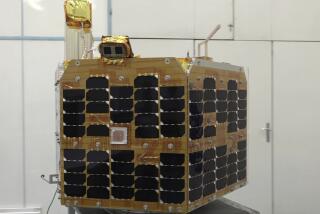U.S. challenges N. Korea satellite claim
WASHINGTON — North Korea’s threatened missile launch is intended to demonstrate its ability to carry out an intercontinental military strike, a top U.S. official said Thursday, brushing aside the country’s claims that it is merely sending a satellite into space.
“Most of the world understands the game they are playing,” National Intelligence Director Dennis C. Blair said. “I think they’re risking international opprobrium and hopefully worse if they successfully launch it.”
Blair’s comments represented the most pointed U.S. challenge so far to Pyongyang’s repeated assertions that its upcoming rocket launch is for peaceful purposes.
Recent satellite images indicate that North Korea is in the final stages of assembling a multistage rocket on a launch platform along the country’s east coast.
The move is seen by some experts as an effort by Pyongyang to command attention from Washington at a time when the Obama administration is focused on other international issues, including the deteriorating security situation in Afghanistan.
Blair’s remarks are the latest in an exchange between the countries that has heightened concerns about whether talks aimed at convincing North Korea to abandon its nuclear weapons program can be restarted. The multiparty talks called for the West to supply North Korea with much-needed aid and other concessions in return for Pyongyang’s dismantling of the program.
North Korea has said it intends to launch the missile between April 4 and 8, a period when President Obama will be meeting with world leaders abroad.
Last week, Pyongyang informed international aviation and maritime agencies that it expected the first stage of its rocket to splash down in the Sea of Japan, and the second to land in the Pacific Ocean.
U.S. Secretary of State Hillary Rodham Clinton warned this week that “there will be consequences” if North Korea goes forward with the launch. In turn, Pyongyang has threatened to reverse the steps it has taken on disarmament if any sanctions are imposed.
The U.N. Security Council banned North Korea from engaging in nuclear weapons activities in 2006, after the country detonated its first nuclear device.
But North Korea argues that the ban does not apply to a satellite launch for civilian purposes.
Blair rejected that position during a briefing with reporters.
“They’re trying to use the rationale of a legitimate space launch for a missile, which is in its foundation a military missile,” Blair said, describing the rocket as a Taepodong, a multistage missile that may be capable of reaching Alaska.
During the briefing, Blair also condemned the human rights record of North Korean leader Kim Jong Il, pointing to the widespread lack of food and fuel.
“I think when that regime finally cracks and the books are written about North Korea, it’s going to be one of the saddest episodes in human history,” he said.
“The statistics on the stunted growth -- physical and mental -- of the overall population in North Korea are just awful, unspeakable.”
Despite persistent shortages, as well as a possible stroke that sidelined Kim last year, Blair indicated that U.S. intelligence agencies do not see a threat to the regime’s hold on power.
“In the near term, at least, we can’t expect some powerful alternative to Kim” to emerge, Blair said.
--
More to Read
Sign up for Essential California
The most important California stories and recommendations in your inbox every morning.
You may occasionally receive promotional content from the Los Angeles Times.










